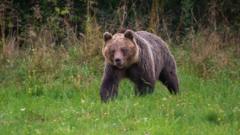Slovakia's cabinet has authorized the culling of 350 brown bears after a recent fatal attack, prompting an uproar from conservationists who argue that the government's actions are unlawful and ineffective. The controversial decision emerges amid rising bear-human encounters and ongoing concerns about wildlife management in the region.
Slovakia Approves Controversial Cull of 350 Bears Following Fatal Attack

Slovakia Approves Controversial Cull of 350 Bears Following Fatal Attack
In response to a string of deadly bear encounters, Slovakia's government greenlights the culling of a significant portion of the nation's brown bears, escalating conservation debates.
The Slovak government has recently approved a contentious plan to cull around 350 brown bears, representing roughly a quarter of the nation’s bear population following the tragic death of a man who was attacked by one in Central Slovakia. The announcement, made by Prime Minister Robert Fico’s populist-nationalist cabinet, underscored the authorities' commitment to public safety amid increasing concerns about bear encounters.
"We can't live in a country where people are afraid to go into the woods," declared Fico during a press briefing after the cabinet meeting. As part of the new measures, a state of emergency has been extended, allowing bears to be culled across 55 of Slovakia’s 79 districts. This modification has raised alarms among wildlife protection advocates, as it reflects a significant shift in wildlife management policies, particularly regarding a protected species.
The government had already relaxed legal protections earlier, permitting bears to be killed if they approach human settlements. According to records, 93 bears had been shot by the end of 2024. Critics like Michal Wiezek, an ecologist and member of the opposition party Progressive Slovakia, condemned the government’s response as inadequate and reactionary. “It’s absurd… the Environment Ministry failed to manage bear encounters effectively, and now they’re attempting to cover up that failure with further culling,” he stated. Wiezek emphasized that numerous interactions between humans and bears occur without harm each year and expressed hope for intervention from the European Commission.
The recent death of a 59-year-old man, who was mauled by a bear while walking in the Detva region, highlights the urgency of the situation. Authorities confirmed that the reclaimed body bore severe injuries, affirming earlier reports of bear activity in the area, including the presence of a bear den.
Political discourse surrounding bears in Slovakia has intensified, especially after other incidents, such as a Belarusian woman’s death while being pursued by a bear in 2024. There have also been alarming sightings of bears in populated areas, leading to a public outcry for action.
Current estimates suggest that Slovakia is home to approximately 1,300 brown bears, yet Environment Minister Tomas Taraba believes that a stable population should be around 800. This divergence in perspective continues to fuel the ongoing debate over wildlife management in Slovakia, as bears roam freely through the Carpathian mountain range, a region extending from Romania to Poland.






















